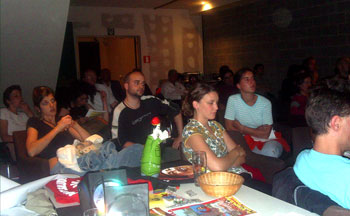The case of RCTV explained in Brussels
- 19 June 2007
On Tuesday 12 June some 70 people gathered in the Centro Cultural Garcia Lorca as part of the "Mardis Politiques", an evening of political debate hosted by Izquierda Unida Brussels Branch (the left party in Spain) to watch the premiere of a film by Angel Palacios ("La señal es nuestra"). The event had been organised by Pas Touche au Venezuela / Hands Off Venezuela in Brussels to counteract the rivers of ink that have been written to attack the Venezuelan revolution about the non-renewal of RCTV licence.
 The meeting was
supported by diffent organisations who last year organised a national event
with more than 350 people in Brussels (includes: Vonk, Oxfam Solidarité,
Collectif Venezuela 13 Avril, Arlac, Vrede, Socialisme
Sans Frontières, Daniel Gillard Committee).
The meeting was
supported by diffent organisations who last year organised a national event
with more than 350 people in Brussels (includes: Vonk, Oxfam Solidarité,
Collectif Venezuela 13 Avril, Arlac, Vrede, Socialisme
Sans Frontières, Daniel Gillard Committee).
Present were also the Ambassador of Cuba and different leaders of the Walloon young peasant's federation, the FUJA, who are really enthusiastic about the ongoing process in Venezuela.
The debate started with a brief introduction by Ronnie Ramirez, film-teacher in Brussels and former collaborator of Vive-TV. He explained the content of the documentary that had been produced in Venezuela to explain the role of RCTV during the coup of 2002 and other counterrevolutionary activities of the channel. He also introduced a new collective, called Vive-Belgique, which translates and subtitles programmes on mediosdelpueblo.org
Then a very attentive audience watched the film for about an hour. Followed by a debate introduced by the coordinator of the Campaign Pas Touche au Venezuela/Hands Off Venezuela, Erik Demeester. The worldwide campaign on "freedom of speech', he explained, against the decision not to renew the licence of RCTV, is part of a plan to destabilise the revolution. The demonstrations of rich students must be added to the economic sabotage, the artificial food shortages etc., aimed at undermining the revolution which has radicalised since the beginning of the year. The panel also had Alejandro Fleming, ambassador of Venezuela in Belgium and Paul-Emile Dupret, who works for the parliamentary group of the Unitary European Left (GUE-GVN) and was active in the bringing the resolution before the European Parliament, which was voted down by a coalition of far-right, Christian democrats and liberals.
In the debate, the moderator made a call to continue the unitary effort that is being made in Belgium to work in a broad coalition to support the Bolivarian Revolution. Erik concluded with proposals for a real extension of freedom of speech. ‘The radio-electrical spectrum should be completely public and under the democratic control of the workers, the communities. Real access to the different media should be guaranteed by their nationalisation".
 Paul-Emile
explained the situation, how the rightwing in the European Parliament
manoeuvres and Alejandro made a detailed account of the real meaning of the
so-called student demonstrations. Also part of the audience was Ivan Hernandez,
Vice-Minister of the Popular power, Mining and Basic industries. He told us
about his past in the socialist movement and how the ruling class is using the
students against the revolution.
Paul-Emile
explained the situation, how the rightwing in the European Parliament
manoeuvres and Alejandro made a detailed account of the real meaning of the
so-called student demonstrations. Also part of the audience was Ivan Hernandez,
Vice-Minister of the Popular power, Mining and Basic industries. He told us
about his past in the socialist movement and how the ruling class is using the
students against the revolution.
After an in-depth debate where all points of view were heard, a collection raised over 70 euros for the campaign and there is the perspective of a workshop about revolutionary media in September. The campaign of the press and media of the ruling class was answered by this event in a modest but important way.